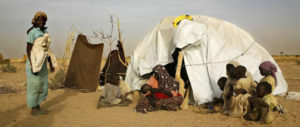Last Friday, the White House did not mention Jews in its Holocaust Remembrance Day message; it was the first time that the 6 million Jews who died have been overlooked in an official message of this sort. Jewish organizations were outraged, including the Zionist Organization of America, which otherwise supports the new Trump administration. Nevertheless, the White House defended the statement, and on Monday Press Secretary Sean Spicer accused the press of “nitpicking a statement that sought to remember this tragic event that occurred, and the people who died.” Shortly after Spicer’s remarks, the United States Holocaust Memorial Museum released a statement explaining the Jewish reaction, which included the following quote from the late author Elie Wiesel: “Not all victims were Jews, but all Jews were victims.”
To not name the victims rewrites history.
Late last Friday, also on Holocaust Remembrance Day, the President signed an Executive Order that targets, without naming, a different religious group. The order bars entry to the U.S. for 90 days of individuals from seven countries: Iraq, Syria, Iran, Sudan, Libya, Somalia and Yemen, the majority of whom are Muslim. It also suspends entry of refugees into the United States for 120 days and indefinitely stops admission to the United States of all Syrian refugees. While not all refugees are Muslims – in fact, of the 85,000 refugees that legally entered the U.S. in 2016, only 46% were Muslim – the conflation of the order turning away refugees, including all Syrians, with a ban on citizens from those seven majority Muslim countries makes it clear that the entire executive order concerns people of just one faith. The order equates Muslims with potential terrorism, despite the fact that there have been no Americans killed in terrorist attacks in the U.S. by nationals from those countries.
Indeed, the order goes on to stipulate that the U.S. will forthwith prioritize refugee claims “made by individuals on the basis of religious-based persecution, provided that the religion of the individual is a minority religion in the individual’s country of nationality.” President Trump has said this specifically means Christians. Prioritizing refugee status on the basis of either religion or nationality is illegal, as U.C. Irvine Law School Dean Erwin Chemerinsky wrote in an Op-ed in Monday’s Los Angeles Times.
Linking the Holocaust to the administration’s new immigration policy is not difficult, even though no religion is specifically mentioned. During the Holocaust the United States similarly denied entry to Jews fleeing the Nazis. President Franklin Delano Roosevelt spoke of a plan “to spread the Jews thin all over the world.” Boats overflowing with refugees were sent back to Hitler’s Europe, damning the passengers to certain death.
Since Friday’s release of the immigration order, many Jews have been using social media to share pictures of deceased relatives who attempted to flee the Nazis but were rejected by the United States and then killed in concentration camps. U.S. refugee policy – prior to this new order – was established to avoid repeating just that history.
Remembering the history of the Holocaust, Jewish World Watch was founded in 2004 by Rabbi Harold M. Schulweis and Janice Kamenir-Reznik to fight genocide, specifically in response to the genocide in Darfur, Sudan. Since its inception, Jewish World Watch has pursued education, advocacy and projects-on-the-ground to fight genocide and mass atrocities, focusing first on Sudan and surrounding countries. More recently we have been advocating on behalf of the Syrian people and the millions of refugees fleeing mass atrocities in their country. Jewish World Watch exists to remind the world that genocide must end now, and that it is the obligation of all of us to not stand idly by. This means doing all that we can to prevent loss of life, particularly among refugees fleeing certain death.
We have witnessed first-hand what life can be like for a refugee. Since 2007, we have visited the Darfuri refugee camps in Chad and returned to tell their stories. We have met women who want to come to America because they can’t return home after the Janjaweed militia violently attacked their villages in Sudan, killing all their men. Women who have witnessed other women tied up and raped until they died. Women who were put in trees that were then set on fire to get them to divulge where their men were. We have heard such stories many times, and yet the Darfuris remain in those camps today. In fact, because of this executive order, some Darfuri refugees who have been in the process to be relocated to the U.S. for years are now being told they are unable to go to the U.S.
We cannot shut our doors to Muslims or people of any faith fleeing terrorism, mass atrocities, or persecution who want to come to America today. Or tomorrow. We must embrace the stranger and remain welcoming when there is need.
Remembering the Holocaust means remembering the history of genocide and what it means to turn our backs. We must stand up to this Executive Order and say together, “No. Never again.”
[su_button url=”http://action.jww.org/app/make-a-call?0&engagementId=282173″ background=”#ba0c2f” color=”#fedd00″ size=”7″ center=”yes”]TAKE ACTION[/su_button]
Tell Congress to fight the White House’s anti-Muslim, anti-immigrant orders.
Susan Freudenheim
Executive Director
Diana Buckhantz
Board Chair


